 J-Jo wishing for world peace (or Bratz
J-Jo wishing for world peace (or Bratzdolls, whichever comes first)
Best wishes to you, your loved ones and your little loved ones
this holiday season and throughout the coming year.
Mrs. J, Mr. J, J-Jo, L-Boogie and ZenBaby
 J-Jo wishing for world peace (or Bratz
J-Jo wishing for world peace (or Bratz My J-Jo's more into stuffing a Build-a-Bear, than actually playing with one. That goes for any plush toy or doll she owns. She still likes the idea of dolls, she's just not interested in committing to any of them. Most of her barbies now go without clothing, finding refuge in the dark under her bed. And I won't get into what happened to the one she took into the bathtub. Let's just say it had to do with soap (lots and lots of soap...). But it's all good, I'm proud that my J-Jo isn't caught up in looking like rapunzel and would much rather play with blocks and build structures that look like they came straight from the pages of Dwell.
My J-Jo's more into stuffing a Build-a-Bear, than actually playing with one. That goes for any plush toy or doll she owns. She still likes the idea of dolls, she's just not interested in committing to any of them. Most of her barbies now go without clothing, finding refuge in the dark under her bed. And I won't get into what happened to the one she took into the bathtub. Let's just say it had to do with soap (lots and lots of soap...). But it's all good, I'm proud that my J-Jo isn't caught up in looking like rapunzel and would much rather play with blocks and build structures that look like they came straight from the pages of Dwell.The Girl is Mine: A Black Mama's Interactive Guide to Shopping for Dolls for Christmas: The Good, The Bad, and The BarbieTo continue reading...
by Deesha Philyaw
In December, a Black Mama's fancy lightly turns to thoughts of celebrating Christmas. What will have the kids dancing with joy in the living room on Christmas morning and reassure Mama that she is affirming their wonderfulness and instilling good values? And eschewing rampant consumerism? And minimizing Santa? And not forgetting Jesus?
I make my list and check it twice:
_xx__Make sure girls know that Christmas is more about giving than getting.
_xx__Make sure girls know that Mommy and Daddy's hard-earned money buy their gifts (with one magical exception from Santa, per child).
_xx__Be joyful.
_xx__Dust off the collection of crèches and arrange festively.
_xx__Cuddle up with girls on the couch to read picture books about the Virgin Birth. Try (and fail) to avoid answering, "Didn't Joseph have a penis?"
_____Search for dolls which are not voluptuous and strip-club-ready, and which do not promote a blonde, blue-eyed standard of beauty.
 When her daughter, Simone, was born a red head, savvy D.C. mom Leigh-Ann Jackson – who happens to be a black woman married to a white man – was inspired to create gear for infant and toddlers that needs no explanation. Her company, Swirl Syndicate, boasts adorable t-shirts with cheeky phrases like "I'm a Little Bit of Everything" (beneath a graphic of a blender) and "She's my mommy, Not my nanny" (perfect for an African American mom like me whose baby was born with blonde hair!).
When her daughter, Simone, was born a red head, savvy D.C. mom Leigh-Ann Jackson – who happens to be a black woman married to a white man – was inspired to create gear for infant and toddlers that needs no explanation. Her company, Swirl Syndicate, boasts adorable t-shirts with cheeky phrases like "I'm a Little Bit of Everything" (beneath a graphic of a blender) and "She's my mommy, Not my nanny" (perfect for an African American mom like me whose baby was born with blonde hair!).  I was thrilled to find out that Will Smith's story of an African American father who beat the system , found personal success and financial security for himself and his young son was number one at the box office it's opening weekend (grossing 27 million). No, that's not the Smart Guy on the movie poster with Will, it's his baby boy Jaden, looking all grown as he makes his big screen debut with his daddy. As if this movie wasn't enough of a tear jerker already.
I was thrilled to find out that Will Smith's story of an African American father who beat the system , found personal success and financial security for himself and his young son was number one at the box office it's opening weekend (grossing 27 million). No, that's not the Smart Guy on the movie poster with Will, it's his baby boy Jaden, looking all grown as he makes his big screen debut with his daddy. As if this movie wasn't enough of a tear jerker already.
 Okay, I'll admit it. I'm actually closer to thirty than forty, but it's just as embarrassing that I'm a thirty-something black woman who has never experienced Kwanzaa. It's not for lack of drive, I love black people. And as far as Afrocentric celebrations go, you might not ever see me sporting an entire African ensemble, but I'd be fine to wrap some cloth around my head. It's when the lights are dimmed that I start to feel uncomfortable...I have no idea what I should do with a kinara, let alone what happens after that. I'm completely inexperienced in all things related to Kwanzaa. Sure, I've had fantasies about the whole experience, but I've never really done the deed. And at my age, it's a problem.
Okay, I'll admit it. I'm actually closer to thirty than forty, but it's just as embarrassing that I'm a thirty-something black woman who has never experienced Kwanzaa. It's not for lack of drive, I love black people. And as far as Afrocentric celebrations go, you might not ever see me sporting an entire African ensemble, but I'd be fine to wrap some cloth around my head. It's when the lights are dimmed that I start to feel uncomfortable...I have no idea what I should do with a kinara, let alone what happens after that. I'm completely inexperienced in all things related to Kwanzaa. Sure, I've had fantasies about the whole experience, but I've never really done the deed. And at my age, it's a problem.  Writer Vincent Williams recalls his family's annual pilgrammage to find a brother from the North Pole:
Writer Vincent Williams recalls his family's annual pilgrammage to find a brother from the North Pole:From the Baltimore City Paper –
This will be my daughter’s first Christmas. Obviously, it doesn’t mean that much to her, her being less than a year old and all. I’m sure in her eyes it’ll be yet another day in the endless adventure that is Hey, I Should Put That in My Mouth. But for Mom and me it’s huge. We have presents to buy, cookies to bake, a tree to decorate, and a Nativity scene to set up with real hay for a little porcelain Jesus. We have to replace the stockings with our names on them with ones that say mommy and daddy. I have to teach my daughter the Cold Miser and Heat Miser songs and James Brown’s “Santa Claus Go Straight to the Ghetto” and, oh, the pictures we have to take.
It’s the pictures that are going to be a little tricky. Our daughter is the first grandchild on my side of the family and the first in more than a decade on my wife’s side, so all eyes are on the inevitable Christmas picture. And in the moment when I finally became my parents, I realized that getting the perfect holiday picture means I have to find a black Santa Claus.
When people talk about “Black Nationalism” or “Black Pride,” the terms evoke images of Black Panthers in black leather jackets or Angela Davis raising a defiant Black Power fist. But I’ve found that cultural pride is more about the day to day. Black Barbies, pictures of relatives, and that ubiquitous bright orange The Best of Earth, Wind, and Fire Vol. I album had more of an impact on post-integration African-American youth than Soul on Ice. No disrespect to Eldridge Cleaver, but I was 18 when I was exposed to him, and I don’t remember a time when I didn’t know the words to “September.”
I know for a fact that my parents never marched, sat-in, or protested, but they are some of the proudest and most quietly pro-black people I’ve ever met. Hell, I’ve been “acting like I come from something” since before I even knew what it was that I came from or what it meant. And they certainly weren’t going to let their children sit in some white Santa’s lap when it was time to take the Christmas picture. So for years there was an annual search for a venue with a black Santa Claus.
 Who doesn't love the left coast? The laid-back attitude and the dependable sunsets are only two reasons I often dream of MJ and I moving back west ('cept with kids this time). And if we ever do, I'd seriously consider relocating to the Bay Area, if for no other reason than the Berkeley Parents Network.
Who doesn't love the left coast? The laid-back attitude and the dependable sunsets are only two reasons I often dream of MJ and I moving back west ('cept with kids this time). And if we ever do, I'd seriously consider relocating to the Bay Area, if for no other reason than the Berkeley Parents Network. It was J-Jo's first day at her new preschool program and I was thrilled to watch her jump in to the group and make friends with a child who seemed just as excited to find a new playmate as she was. I'd been nervous about that – the school was perfect, except it severely lacked diversity. Naturally, I felt a sense of relief when another (the only other) black child showed interest in playing with her. I hate to think that these things would be so important this early on, but one could never be too sure.
It was J-Jo's first day at her new preschool program and I was thrilled to watch her jump in to the group and make friends with a child who seemed just as excited to find a new playmate as she was. I'd been nervous about that – the school was perfect, except it severely lacked diversity. Naturally, I felt a sense of relief when another (the only other) black child showed interest in playing with her. I hate to think that these things would be so important this early on, but one could never be too sure. Remember the Sesame Street classic, "Eleven Twelve"? My almost five year old seems to like watching this (over and over on You Tube) better than the actual show itself these days.
 It didn't take long for our generation to realize that some babies have musical tastes that reach far past the classical confines of Baby Einstein. These brand new brainchildren of entrepreneurial parents are targeted towards tomorrow's (slightly more gentrified) hip hop heads:
It didn't take long for our generation to realize that some babies have musical tastes that reach far past the classical confines of Baby Einstein. These brand new brainchildren of entrepreneurial parents are targeted towards tomorrow's (slightly more gentrified) hip hop heads: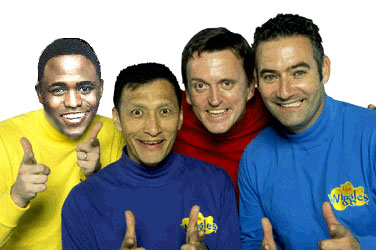
I've always loved this guy. Mr. J considers the man a comedic genius. If we knew him, he'd have a standing invitation to dinner at our house.
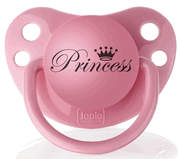 Straight from the hairdresser's mouth: P. Diddy and his girlfriend, Kim Porter, celebrated their forthcoming twin girls at a fabulous Manhattan baby shower on November 19th. The happily unmarried couple recently had a frank discussion with writer Jeanine Amber, going public with their epic love story for the December issue of Essence.
Straight from the hairdresser's mouth: P. Diddy and his girlfriend, Kim Porter, celebrated their forthcoming twin girls at a fabulous Manhattan baby shower on November 19th. The happily unmarried couple recently had a frank discussion with writer Jeanine Amber, going public with their epic love story for the December issue of Essence.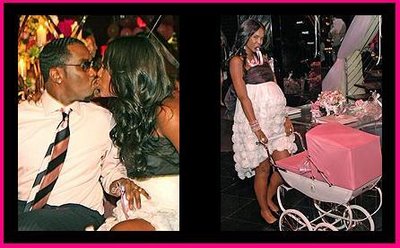

 A true legend in television journalism, Ed Bradley was exemplary.
A true legend in television journalism, Ed Bradley was exemplary. 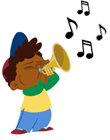 Name: Quincy
Name: Quincy Name: Shanna
Name: Shanna  Name: Clementine
Name: Clementine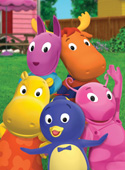 Name: Tasha, Uniqua, Austin, Pablo and Tyrone
Name: Tasha, Uniqua, Austin, Pablo and TyroneThis short film, A Girl Like Me, is a must-see for anyone who has influence in the life of an African American child. In less than ten minutes, the telling documentary illustrates how far we still have to go in regards to our self-image. Seventeen-year-old director, Kiri Davis should be commended. And given a free-ride to Spelman.
I cried watching this as I considered how each of my beautiful daughters – who differ from each other in both skin tone and hair texture – might internalize similar feelings to the ones expressed in this piece. I hate to think that they will, but what black woman hasn't...at least to some degree?
It's past time for this chain to be broken. But where do we even begin?
 I'm always tickled when my daughter laughs at The Cosby Show. Not that it's odd that a four-year-old is able to get the humor (it's pretty straightforward, and she has a great comedic sense anyway). I'm tickled because if the Cos' knew my J-Jo, he'd love her. Had she been born in the 80's, Raven Symone would still be handing out demo tapes today. To say my child is precocious would not descibe her accurately enough. To say she's a sparkle-butt would.
I'm always tickled when my daughter laughs at The Cosby Show. Not that it's odd that a four-year-old is able to get the humor (it's pretty straightforward, and she has a great comedic sense anyway). I'm tickled because if the Cos' knew my J-Jo, he'd love her. Had she been born in the 80's, Raven Symone would still be handing out demo tapes today. To say my child is precocious would not descibe her accurately enough. To say she's a sparkle-butt would.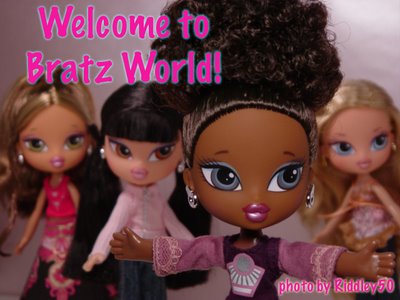
 Thirty years ago, my grandfather was walking on a sandy beach in Acapulco when he was accosted by a group of adoring fans. They wanted to see him up close and maybe even get an autograph. No, grandpop wasn't anyone famous. He was just a retired postal worker from Philly who retired to Mexico in search of the good life. The man had no idea that part of that "good life" would include being mistaken for Sammy Davis Jr. more times than the Candy Man was probably recognized himself.
Thirty years ago, my grandfather was walking on a sandy beach in Acapulco when he was accosted by a group of adoring fans. They wanted to see him up close and maybe even get an autograph. No, grandpop wasn't anyone famous. He was just a retired postal worker from Philly who retired to Mexico in search of the good life. The man had no idea that part of that "good life" would include being mistaken for Sammy Davis Jr. more times than the Candy Man was probably recognized himself. I'm a Northern black woman who grew up in a family whose idea of a traditional meal was spaghetti with meat sauce. No soul food savvy matriarchs have graced either side of my family tree since the great migration. So when my own kids were born, I was determined to raise them as part of a clan that ate traditional African American food throughout the year, not just on holidays.
I'm a Northern black woman who grew up in a family whose idea of a traditional meal was spaghetti with meat sauce. No soul food savvy matriarchs have graced either side of my family tree since the great migration. So when my own kids were born, I was determined to raise them as part of a clan that ate traditional African American food throughout the year, not just on holidays. 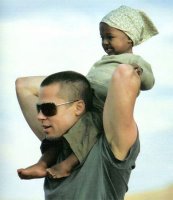 Sisters are miffed about about Angelina Jolie's upcoming starring role in a film about part Afro-Cuban journalist Marianne Pearl. Many resent that a white girl would even attempt to use self-tanner to portray a woman of color. Don't get me wrong, I'm not down with the neo black-face, either. But it's hard for me to completely blame the actress when I find it highly conceivable that within the multi-cultural, Jolie-Pitt clan, love has become color-blind. With a beloved brood that resembles a mini model U.N., it's quite possible that racial differences are the furthest thing from the Brangelina radar.
Sisters are miffed about about Angelina Jolie's upcoming starring role in a film about part Afro-Cuban journalist Marianne Pearl. Many resent that a white girl would even attempt to use self-tanner to portray a woman of color. Don't get me wrong, I'm not down with the neo black-face, either. But it's hard for me to completely blame the actress when I find it highly conceivable that within the multi-cultural, Jolie-Pitt clan, love has become color-blind. With a beloved brood that resembles a mini model U.N., it's quite possible that racial differences are the furthest thing from the Brangelina radar. 